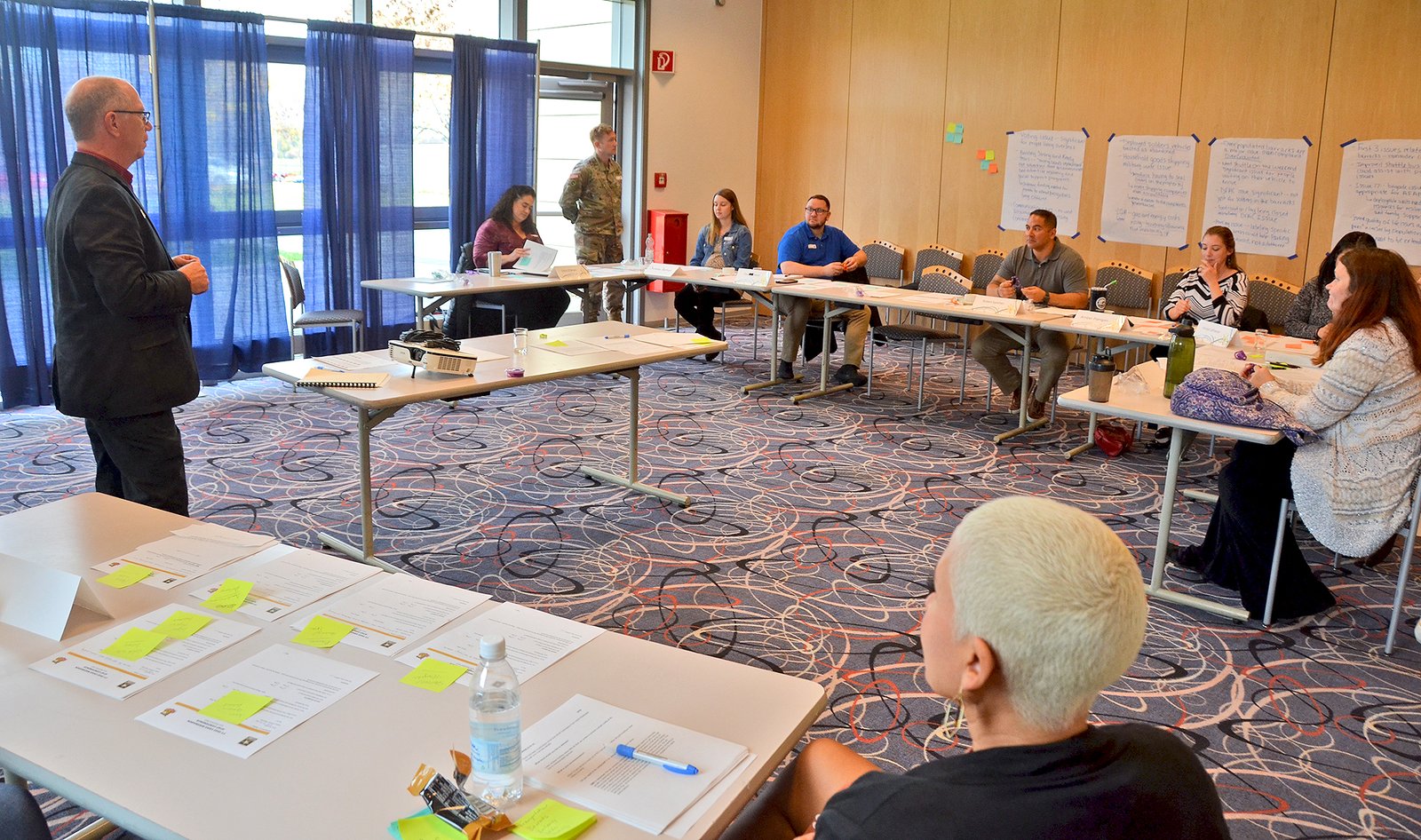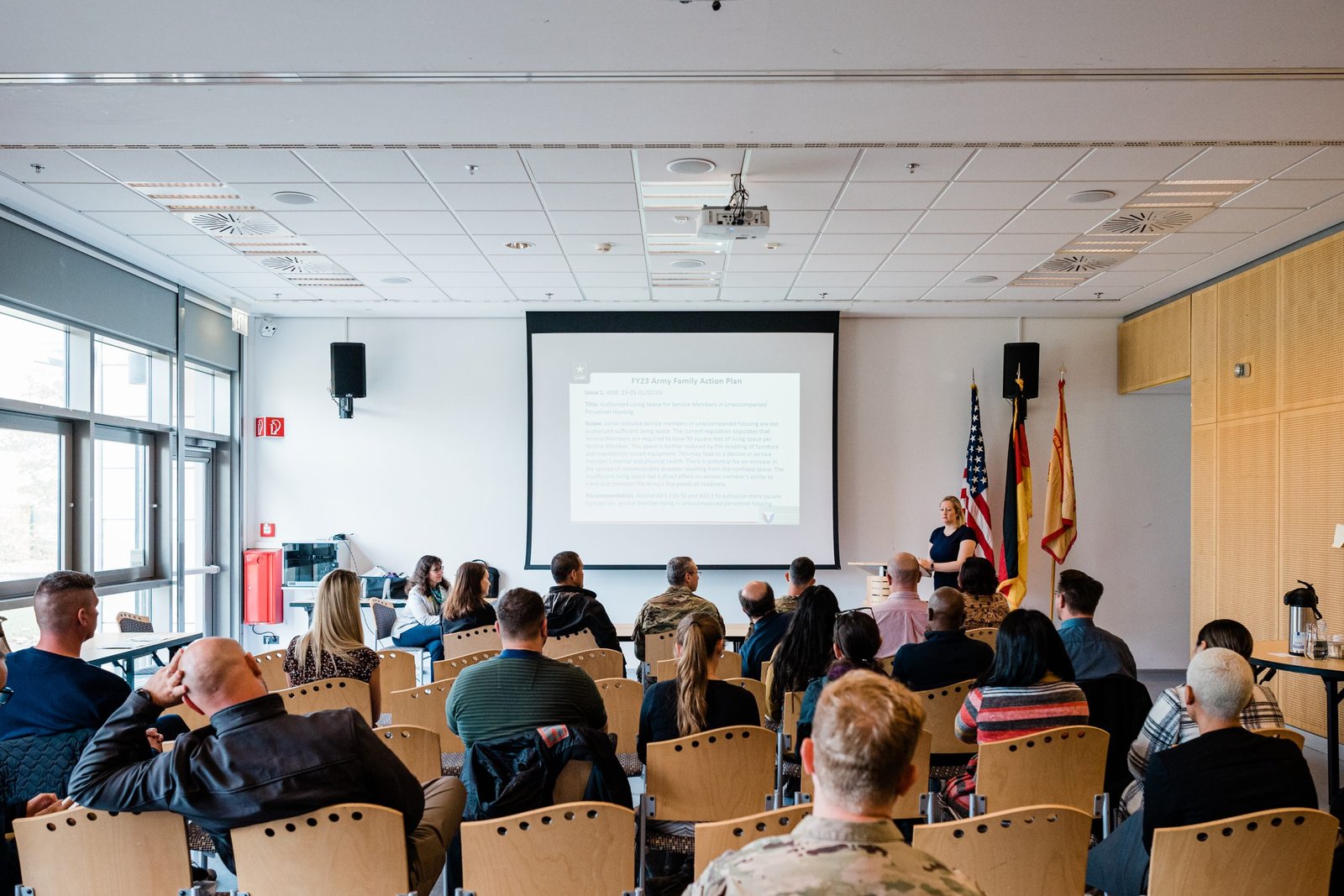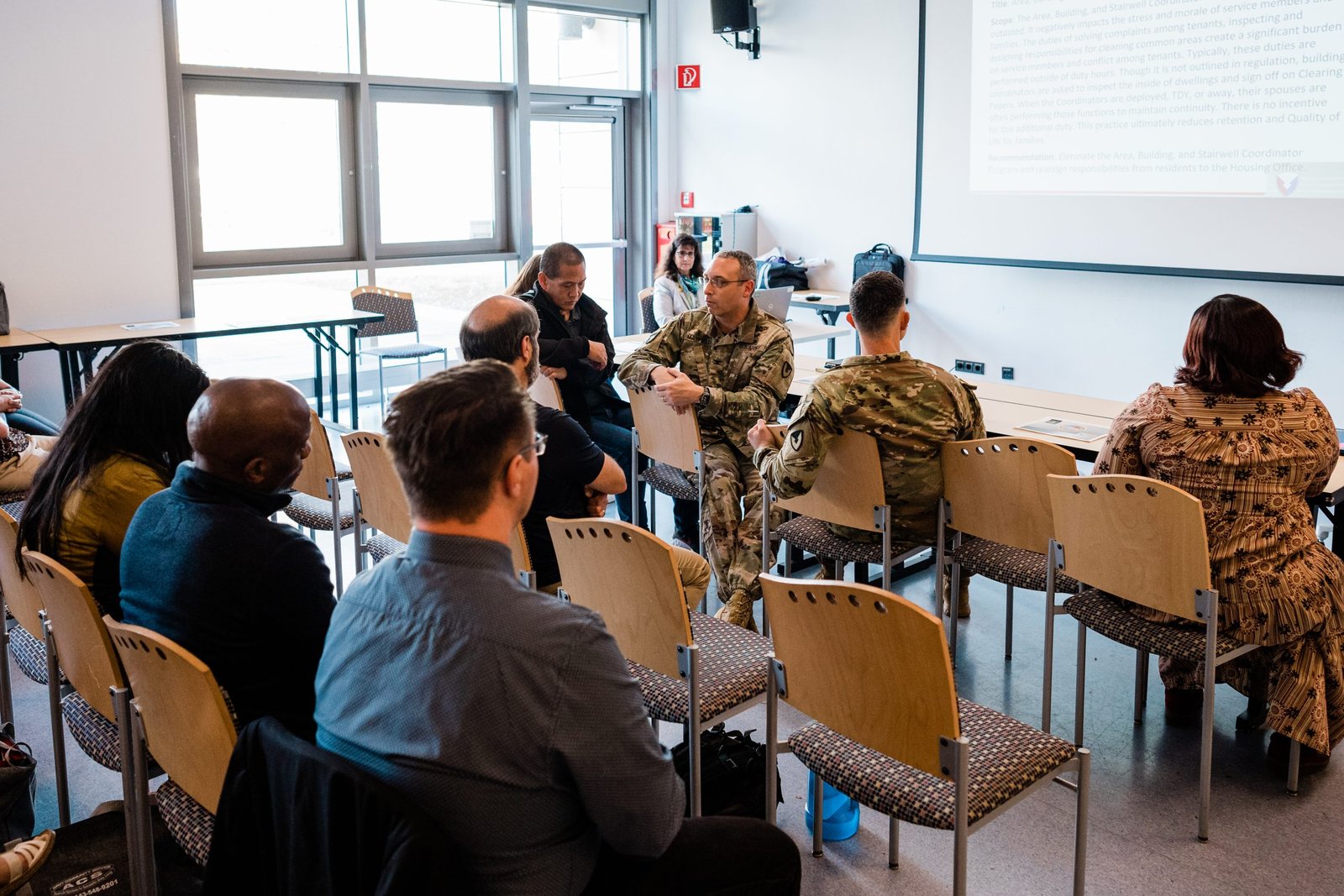Disclaimer: This article is not sponsored and not endorsed by the U.S. Army. This article is a personal blog post. It is based on my experience as an AFAP volunteer and my personal opinions about it.
Did you know that the U.S. Army has a platform for service members, affiliated family members, and all other garrison community members to complain professionally and productively about quality of life issues at many garrisons or installations?
This beats ranting on the garrison's Facebook page or in private Facebook groups. Why?
You're least likely to get the attention of the people who can make improvements and changes on social media. And you're less likely to be taken seriously there.
So let's learn more about where to pitch our issues, concerns, and recommended solutions to the higher leadership.
Introducing, the Army Family Action Plan!

The Army Family Action Plan (AFAP) aims to serve families, soldiers, and civilians in their local army garrisons. Picture source: Benelux MWR
In this blog post, we'll discuss the following:
What is the Army Family Action Plan (AFAP)?
It’s a constructive way to let your garrison's Army leadership know about what works and what doesn’t in the community. And how you think problems can be resolved.
The AFAP is part of the Army Community Service (ACS) that is present on every army garrison. The AFAP:
- Collects issues and recommendations from the local community all year
- Refines the issues into a memo to submit for review by garrison command leadership
- AFAP memos can be escalated all the way up to the Department of Army and Department of Defense depending on the nature of the issue and recommended solution
- AFAP conferences are usually held once a year and community members are usually invited to take part
The AFAP we know today was born from the initiative of our military spouse ancestors who wanted to raise the voices of army families.
A little bit of the AFAP's history below (I LOVE history) extracted directly from a 1991 document titled 'The Army Family Research Program: Origin, Purpose, and Accomplishments':
- "In 1980, 1981, and 1982, the Officers' Wives Club of the Greater Washington Area and the Association of the United States Army sponsored a series of Army Family Symposia that brought together family members from all over the world to discuss changes in the services and programs provided by the Army."
- "Senior Army officials such as the 1984 Chief of Staff of the Army (CSA), GEN Edward C. "Shy" Myer and the Deputy Chief of Staff of Personnel, LTG Maxwell Thurman attended the conferences. The Army listened and responded to the families."
- "One response was the creation of the Family Liaison Office (FLO) in the Office of the Deputy Chief of Staff of Personnel (ODCSPER) in 1982 with a staff and hot line to increase communications between the Army and the families."
- "In addition, a Family Action Planning Conference was held at Ft. Belvoir in July of 1983 to begin formulating solutions to the issues raised in the Army Symposia and to report back to the families the progress that had been made in solving these concerns."
- "In addition, a Family Action Planning Conference was held at Ft. Belvoir in July of 1983 to begin formulating solutions to the issues raised in the Army Symposia and to report back to the families the progress that had been made in solving these concerns."
Some achievements of the AFAP thus far: (source here)
- Soldier Pay and Leave: Improvements in soldier paternity leave, increased annual leave carryover from 60 to 75 days
- Educational Benefits: allowed distributions of soldier's Montgomery G.I. Bill benefits to their dependents, extended educational benefits for spouses, in-state tuition for dependents
- Child Care: dedicated special needs space in Child, Youth, and School Services (CYSS), implemented audio/video surveillance in child care centers, set minimum standards for Army child care
- Single Soldiers: established funding for Better Opportunities for Single Soldiers (BOSS)
- Spouse Employment: spouses allocated professional weight allowance for permanent change of duty station (PCS) moves, allowance for family member employment in the Civil Service System

To help raise the voices of those who need to be heard is an underrated superpower. We're forever grateful to the spouses who spearheaded the creation of the AFAP!
My AFAP Conference Experience as a delegate
November 2022.
My Soldier and Family Readiness Group (SFRG) advisor sent out an email about this AFAP conference.
"What's it all about?" I asked her. Because all my nerd brain processed was, "CONFERENCE. YES, WE LOVE CONFERENCES!"
I figured it'll be wise to find out what it was before signing up for it.
As soon as she told me I could be part of a group to brainstorm solutions for problems within our garrison, I jumped at the chance. We got to present our solutions to the garrison's command leadership too!
On top of that, I didn't have to be a subject matter expert or have any type of experience to volunteer as a delegate. I just had to be me and bring my life experiences to the table.
What better way to get our community's problems heard on a professional level?
There were only 2 groups of delegates during the conference. With over 50 issues submitted. And each group could only prioritise 3 topics. We definitely would've benefited from having more volunteers so that we'd have more groups to prioritise more topics!
As delegates, our role was to read through all the issues submitted to our garrison's AFAP website. And rank those issues based on our experiences, needs, and circumstances.
This is what I really loved about the experience. I was able to bring my bias and personal needs to the table. And not get judged for it!
In fact, the ACS staff who ran the AFAP conference (shoutout to Ms Federica and Ms Hellen of the Wiesbaden ACS) encouraged us delegates to form ideas that way.
This helped our groups end up with a variety of insights to work through together. We also learned a lot about the different demographic's problems and experiences as part of the Army family!
The most exciting part of this event was to be taken seriously as a military spouse. This Army family demographic still tends to get sidelined or not taken seriously when we raise our concerns. Plainly because there's still some stigma against military spouses being "just wives" and usually "having nothing better to do".
So, the AFAP really gave me and my fellow military spouse delegates a judgement-free platform to ask questions and put our ideas forward. Regardless of what anyone else thinks of them!
By the end of the 3-day conference, I felt a sense of purpose I was sure I'd lost since leaving my career. I felt like I mattered. And I developed a newfound appreciation for the military families who have been in this life for decades longer than me.

My AFAP working group! My face is hidden away in the right-most corner, unfortunately. Picture source: Wiesbaden Army MWR Flickr Album
What's the Difference between AFAP and Interactive Customer Evaluation (ICE)?
In our military community, we're encouraged to submit ICE comments for complaints, compliments, and feedback about programs and services we use.
It helps to understand that the AFAP issue submission pathway tracks differently than ICE. Then, you'll have an idea why some issues within your garrison might take longer or shorter to get resolved. Or why some issues seem to keep repeating.
The Stuttgart Citizen website has got a very concise and comprehensive article on these terms. I quote them,
"Interactive Customer Evaluation (ICE) comments are single incidents, concerns and feedback that affect individuals, vs. the community at large. Think of the ICE system as a place to submit a service comment card."
"Issues submitted through AFAP concern the entire population living and working within the garrison and beyond. Changes can affect personnel and families Army-wide or even Department Of Defense-wide."
To put things into context, here's how you can use ICE and AFAP.
When to submit an ICE comment: If you think that an incident you experienced can be directly improved by the program or service you used, then submit an ICE comment.
- Example: You attended a Spouse Orientation program at the ACS on base. You think there should be additional information for you as a foreign-born national. You have some ideas of topics for ACS to include in the program. Submit this as an ICE comment!
When to submit an AFAP issue: If you think a problem that you're facing is affecting many families that are part of the garrison you're stationed at , then submit an AFAP issue. Especially if you think a problem may affect all army families stationed anywhere in the world!
- Example: There are no nursing areas at the clinic on base. You'd like to request this facility be added so that you and everyone else who has to nurse their babies while waiting in clinic has a quiet and private space to do so. Submit this as an AFAP issue!

My AFAP group's spokesperson presenting our top 3 topics to the garrison command leaders and everyone else. Picture source: Wiesbaden Army MWR Flickr Album
Who can take part in the AFAP conference?
As long as you're a member of your garrison's community, you should be able to take part in the conference.
- Service Members (Active Duty and Reserves)
- Military Spouses
- Army Civilians
- Army Civilian Spouses
- Retirees, Veterans, and Survivors
Ask your local ACS office about the AFAP conference and if you can attend it. Roles that may be available at your garrison's AFAP conference include the following and more:
- Delegate
- Facilitator
- Subject Matter Expert
- Conference Assistant
3 Reasons Why You Should Take Part In The AFAP Conference
- 1This is your moment to champion issues that directly affect you and your families!
- 2For those of us military spouses who are at home all day with our small kids, this is a wonderful way to have adult conversations. And to flex our mental and creative muscle around solving adult problems!
- 3It's a great way to learn more about the resources in your garrison and how they're serving the community at that point in time
3 Reasons Why Garrisons Should Open The AFAP Conference To Their Community
- 1Get the very people the AFAP is meant to serve to be part of the solution! This is how garrisons can tailor recommendations and solutions specifically for their community members
- 2Get more creative ideas for solutions to long-standing problems
- 3The act of involving community members in a high impact event like this sends a message that garrison leadership really cares about the community and wants to work directly with them to solve their issues

It's nice to see our garrison command leadership open to casual conversations with community members. Taking away rank and formalities to solve problems together is a smart thing to do! Picture source: Wiesbaden Army MWR Flickr Album
I think that the AFAP is a wonderful way for garrison leadership to stay on the pulse of what their community really needs and wants for a better quality of life.
It's also a great way to built rapport and trust between garrison leaders and community members.
(Also super proud that military spouses before me were the ones to spearhead this program!)
I'm definitely volunteering again to take part in the next AFAP conference. And I hope you will too!
A Quick Win: Submit An AFAP Issue To Your Garrison Today!
- 1Follow the AFAP submission instructions in this Army MWR webpage
- 2Submit your AFAP issue(s) and recommendation(s) of solution(s) using the Army's Issue Management System (IMS) here
- 3Contact your local ACS office to learn more about the AFAP and how you can take part in this year's conference!

Thank you for your sharing. I am worried that I lack creative ideas. It is your article that makes me full of hope. Thank you. But, I have a question, can you help me?
Your article helped me a lot, is there any more related content? Thanks!
Can you be more specific about the content of your article? After reading it, I still have some doubts. Hope you can help me.
Thanks for sharing. I read many of your blog posts, cool, your blog is very good.
Can you be more specific about the content of your article? After reading it, I still have some doubts. Hope you can help me.
I don’t think the title of your article matches the content lol. Just kidding, mainly because I had some doubts after reading the article.
Thank you for your sharing. I am worried that I lack creative ideas. It is your article that makes me full of hope. Thank you. But, I have a question, can you help me?
Your article helped me a lot, is there any more related content? Thanks! https://accounts.binance.info/en/register-person?ref=JHQQKNKN
Your point of view caught my eye and was very interesting. Thanks. I have a question for you. https://accounts.binance.com/bn/register?ref=UM6SMJM3
Your point of view caught my eye and was very interesting. Thanks. I have a question for you.
Reading your article helped me a lot and I agree with you. But I still have some doubts, can you clarify for me? I’ll keep an eye out for your answers.
Can you be more specific about the content of your article? After reading it, I still have some doubts. Hope you can help me.
I don’t think the title of your article matches the content lol. Just kidding, mainly because I had some doubts after reading the article. https://accounts.binance.info/register?ref=P9L9FQKY
Your point of view caught my eye and was very interesting. Thanks. I have a question for you.
Your point of view caught my eye and was very interesting. Thanks. I have a question for you.
Your point of view caught my eye and was very interesting. Thanks. I have a question for you.
Thanks for sharing. I read many of your blog posts, cool, your blog is very good.
Can you be more specific about the content of your article? After reading it, I still have some doubts. Hope you can help me.
I don’t think the title of your article matches the content lol. Just kidding, mainly because I had some doubts after reading the article.
Your article helped me a lot, is there any more related content? Thanks!
Thanks for sharing. I read many of your blog posts, cool, your blog is very good.
Your article helped me a lot, is there any more related content? Thanks!